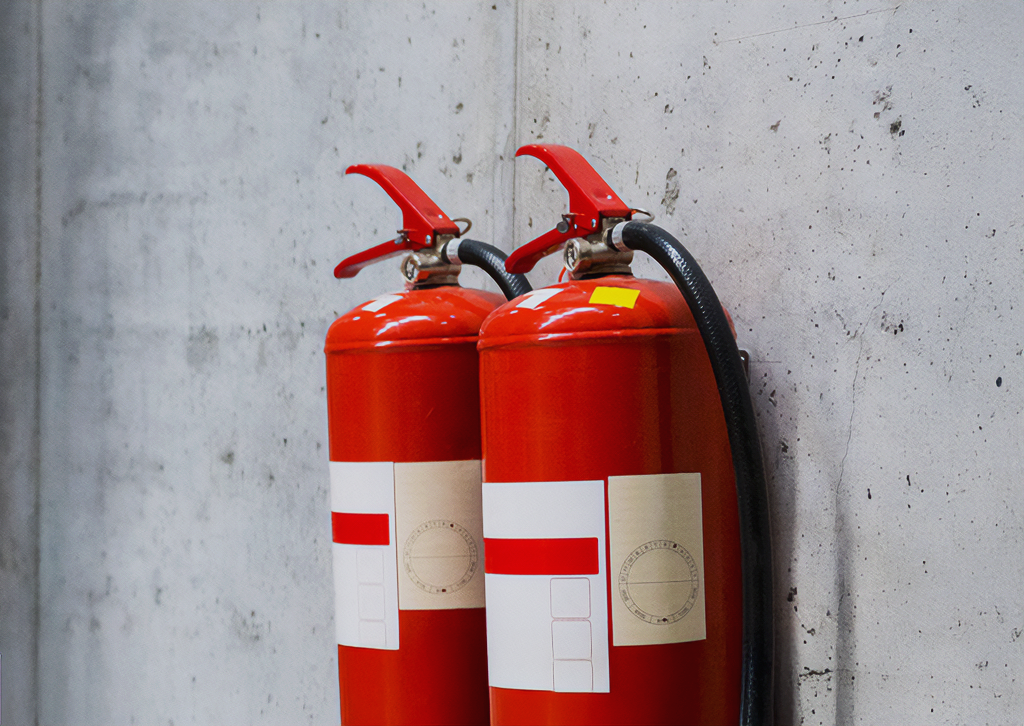Understanding Fire Extinguishers: Essential for Business Owners & Facility Managers
Fire extinguishers are a fundamental part of fire safety, but selecting the right one can be complex. With six fire classes and various extinguisher types, using the wrong one could worsen a fire.
Whether you manage an office, warehouse, retail space, or commercial kitchen, understanding the correct fire extinguishers for your premises is critical for compliance and safety.
This guide covers:
- The six fire classes and their causes
- Fire extinguisher types and their uses
- UK legal requirements for businesses
- How to ensure compliance and proper maintenance
The Six Fire Classes
Each type of fire requires a specific extinguisher.
| Fire Class | Caused By | Recommended Extinguisher |
|---|---|---|
| Class A | Wood, paper, textiles | Water (Red) or Foam (Cream) |
| Class B | Flammable liquids (petrol, paint) | Foam (Cream) or CO2 (Black) |
| Class C | Flammable gases (methane, propane) | Dry Powder (Blue) |
| Class D | Combustible metals (magnesium, lithium) | Specialist Dry Powder (L2/M28) |
| Electrical Fires | Electrical equipment, wiring | CO2 (Black) |
| Class F | Cooking oils and fats (deep-fat fryers) | Wet Chemical (Yellow) |
Important: Using the wrong extinguisher can increase fire hazards.
Fire Extinguisher Types and Their Uses
Water Extinguishers (Red Label)
- Best for: Class A fires (wood, paper, textiles)
- Commonly used in: Offices, schools, shops
- Not suitable: Electrical or flammable liquid fires
Foam Extinguishers (Cream Label)
- Best for: Class A and B fires (solid materials and flammable liquids)
- Commonly used in: Warehouses, petrol stations, hotels
- Not suitable: Flammable gas or metal fires
Dry Powder Extinguishers (Blue Label)
- Best for: Class A, B, and C fires (wood, liquids, gases)
- Commonly used in: Factories, welding areas, garages
- Not recommended for indoor use due to inhalation risks
CO2 Extinguishers (Black Label)
- Best for: Electrical fires and Class B fires (flammable liquids)
- Commonly used in: Server rooms, offices, retail spaces
- Not suitable for: Class A (wood/paper) or Class F (cooking oil) fires
Wet Chemical Extinguishers (Yellow Label)
- Best for: Class F fires (cooking oils and fats)
- Commonly used in: Restaurants, commercial kitchens
- Not suitable for: Electrical or metal fires
Fire Safety Laws: What UK Businesses Need to Know
The Regulatory Reform (Fire Safety) Order 2005 requires all businesses to:
- Install suitable fire extinguishers
- Ensure staff are trained in their use
- Conduct regular fire risk assessments
How Many Fire Extinguishers Do You Need?
Under British Standards (BS5306-8:2012):
- A minimum of two Class A extinguishers per floor is required
- A CO2 extinguisher is needed for electrical fire risks
- Extinguishers must be positioned by exits and alarm points
- No one should be more than 30 metres from an extinguisher
Failure to comply can result in fines or legal action.
Request a fire safety assessment today.
Where Should Fire Extinguishers Be Placed?
- Mounted on walls or stands for easy access
- Clearly labelled with usage instructions
- Located near fire risks (e.g., kitchens, fuel storage areas)
Tip: Fire extinguishers must be regularly inspected to ensure they remain accessible and functional.
Fire Extinguisher Maintenance & Compliance
Fire extinguishers require regular maintenance to remain compliant and effective.
Legal Maintenance Requirements
- Commissioning: A fire extinguisher is only compliant if installed by a BAFE-certified engineer
- Annual servicing: Required by law
- Monthly checks: Should be conducted to identify damage, leaks, or pressure loss
When to Replace Fire Extinguishers
- Water, foam, and powder extinguishers: Every five years
- CO2 Extinguishers: Every ten years
Safe disposal is essential – never discharge old extinguishers into drains.
Schedule a maintenance check
Why Choose Iris VBS
At Iris Fire & Security, we provide expert fire extinguisher services across Oxfordshire and surrounding areas.
Our Services Include:
- Fire extinguisher supply, installation, and commissioning
- BAFE-certified engineers for compliance assurance
- Ongoing maintenance and servicing contracts
- Expert fire risk assessments for businesses
Need professional fire extinguisher services?
Contact us today or request a free consultation.


